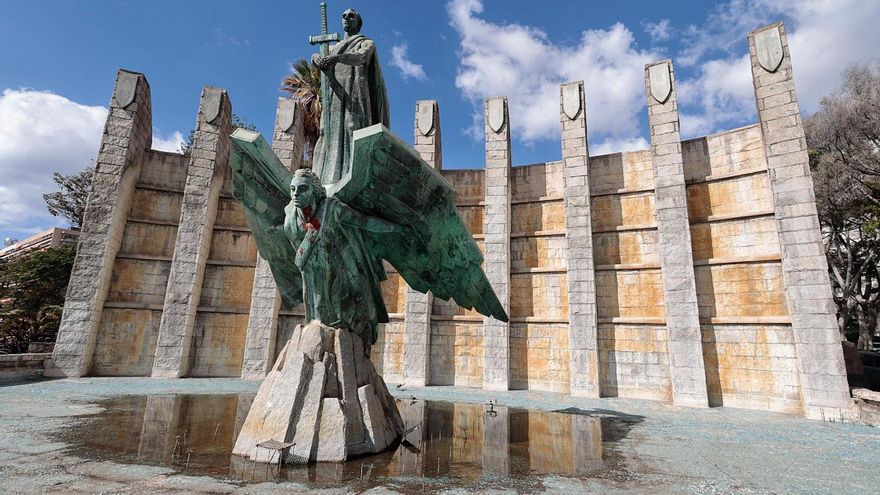
The editorial team of the Catalog of symbols, streets, monuments and Francoist references in Canary Islands has concluded the third and final stage of this document, comprising 9,300 pages and a total of 428 registered items, which will now be forwarded to the regional government.
Consequently, Francisco García, the rector of the University of La Laguna, hosted the art history research group responsible for compiling the catalogue, with this last submission focusing on the remaining islands of the archipelago following the completion of the First Phase, relating to Santa Cruz de Tenerife, and the second concerning the island capitals.
The catalogue, in line with the agreement signed in June 2022 with the Regional Executive and in compliance with the stipulations of the Organic Law regarding this matter, details the Francoist elements identified across the eight islands, now totalling 428 registered items, of which 225 are from the province of Santa Cruz de Tenerife and 203 pertain to Las Palmas.
The remnants encompass names of public spaces, sculptures, artefacts, inscriptions, gravestones, coats of arms, and honours and distinctions linked to the era of dictatorship, as stated by the University of La Laguna on Tuesday.
The initiative has been spearheaded by Professor of Art History Isabel Navarro, alongside head professor Jesús Pérez, and researchers Yanira Hermida and Kumar Kishinchand, with contributions from Yolanda Peralta and Ricardo Guerra.
The second phase of this project was submitted in July 2023, focusing on the island capitals, and this third phase marks the completion of the task for the University of La Laguna’s research team, who have noted the challenging nature of sourcing information from municipal archives, many of which remain undigitised, and the “lack of proactivity” encountered in certain areas.
The researchers have indicated that the document was submitted by the end of March, in a timely manner, and should be complemented by dissemination initiatives, as highlighted in the agreement established with the academic institution, to ensure that its content is accessible at all educational levels across the archipelago.
In this regard, the professor has pointed out a profound lack of knowledge regarding recent Spanish history and the growing inclination among youth groups to affiliate with extreme right-wing movements.
It has been reported that following the signing of the agreement in 2022, while the first phase was in development, the Democratic Memory Law was introduced, which has served as “a necessary update to ensure the essential alignment” of institutional actions related to historical memory at both national and regional levels, given the varying actions undertaken.
Thus, the law specifies that it aims to “preserve and maintain the memory of the victims of conflict and the Francoist dictatorship, through the recognition of truth as a right of the victims, the establishment of justice, and the promotion of reparations as well as the obligation of public authorities to uphold the memory, in order to prevent any recurrence of political or totalitarian violence.”
The “catalogue of symbols and elements opposed to democratic memory” represents the procedure outlined in current legislation, which involves a registry of vestiges of the State, in cooperation with autonomous communities through an integrative process involving the procedures adopted in various regions of the country.
In addition to the catalogue, the law also suggests the establishment of a Documentary Virtual Centre for Historical Memory in the Canary Islands, aimed at creating curricular content for integration into primary, secondary, and higher education as well as developing resources for university degrees, all of which remains to be addressed.
The document has been crafted in accordance with this law and its methodology has been submitted for approval by the body designated in the standard, the Historical Memory Technical Commission, which definitively endorsed the document corresponding to the first phase, concerning the municipality of Santa Cruz de Tenerife, in November 2022.
The rector has emphasised that the catalogue fortifies historical memory “to ensure that we never forget the past,” whilst serving as “a powerful resource for citizens who have not previously had direct access to knowledge of these significant events in our country’s recent history.”
















